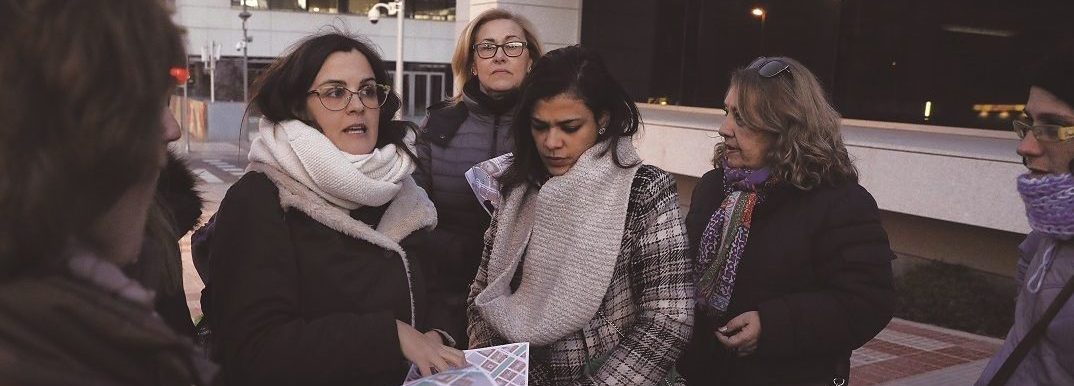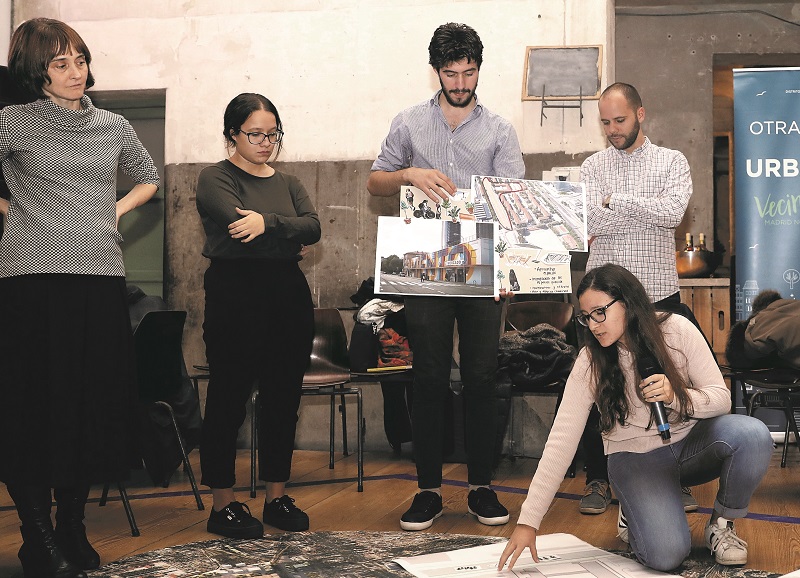2 December 2020
for Madrid Nuevo Norte

Distrito Castellana Norte (DCN) has collaborated with the Menéndez Pelayo International University (UIMP) to organise the on-line course on “Inclusion, citizenship and measuring social impact in urban developments”, which took place on 30 November and 1 December. The course, co-organised by DCN, under the direction of Almudena Cano, with a PhD in Architecture from the Royal College of Art, brought together several leading national and international experts in participatory urban design to analyse the best practices in urban developments throughout the world.
Given the high level of the seminar, and the particular relevance of Madrid Nuevo Norte, two special guests were invited as keynote speakers for the opening and closing of the event. The speaker for the opening session was Mariano Fuentes, City Councillor for Urban Development, who highlighted the importance of citizen engagement in all aspects of social and political life, and especially urban design. The Councillor stated that this engagement should take place in the framework of viable projects, and should be encouraged by the administrations. Fuentes underlined that Madrid Nuevo Norte has been exemplary in this respect. He explained that this approach is being applied to other projects that the City Council has launched in Madrid, such as the Metropolitan Forest.
The course was closed by José Manuel Calvo, Madrid City Councillor and former delegate for Sustainable Urban Development, who explained the public participation processes developed for Madrid Nuevo Norte. Calvo highlighted the town hall forums organised by the City Council that helped steer away the debate on Madrid Nuevo Norte from “Manichean simplifications” towards a more constructive discussion on what the city needs and, ultimately, agree on “a consensus project”.
The common thread of all presentations and panel discussions at this meeting, organised by the prestigious university based at Santander, showed that 21st-century urban design has placed people at the heart of its different approaches. A concept that came through in the master class by Peter Bishop, Professor of Urban Design at the Bartlett School of Architecture and author of the famous essay “The Temporary City”, and in the presentations by experts such as Helen Goodwin (Design South East London), Jone Belausteguigoitia (Lur Studio), Alicia Gómez Nieto or Gustavo Romanillos, who shared their professional experiences in social engagement processes in different urban development projects around the world.
DNC’s Social Engagement Manager, Gema del Pozo, shared her experience in Madrid Nuevo Norte, a project in which citizen engagement is particularly relevant. This urban regeneration project seeks to close the vast void created by train tracks in an area where over half a million people live in Madrid, and that impacts mobility, security and lack of facilities. “DCN believes that engagement is essential and, for this reason, our company has been a pioneer in creating a Social Engagement Area, our bridge to the citizens,” Del Pozo explained.
The outcome of DCN’s work with citizens was illustrated during the panel discussion with citizens who engaged first-hand in major national and international urban developments. Paulina Bonilla, a member of a women’s group that took part in the safety audits of the Madrid Nuevo Norte Gender Report, Lorenzo Álvarez, president of the Las Tablas Residents’ Association, and Eduardo Morán, president of Pymes Chamartín, shared their viewpoints on their collaboration with Distrito Castellana Norte and what it has contributed so far.
“The creation of the Social Engagement Area marked a turning point, because, at long last, ordinary citizens were able to talk about urban design in simple terms, not in technical jargon that is incomprehensible for many of us”, explained Morán. “They listened to us, and we were able to debate what city model we want. For instance, we considered essential that the project take care of neighbourhood businesses, and our call was heard,” he concluded.
In this same vein, Álvarez affirmed that “Madrid Nuevo Norte can be the solution to many problems faced by Las Tablas district”, including mobility, physical connection with the Fuencarral-El Pardo district, and few public facilities. For this reason, the association considered from the outset that our involvement in the project was essential to get the neighbourhood’s demands acknowledged. For her part, Paulina Bonilla shared her experience with the safety audits organised with the residents of the districts surrounding Madrid Nuevo Norte to identify “black spots” that limit women’s’ freedom of movement. Madrid Nuevo Norte has a Gender Report that was taken into account since the planning phase to ensure that the new neighbourhood is genuinely inclusive, and accommodates different uses for all segments of the diverse population that make up the city, its infrastructures and its public spaces.

In addition to working with residents and groups on the project, DCN’s Social Engagement extends to the whole city, collaborating with various universities and institutions.
Gema del Pozo recalled that Madrid Nuevo Norte has moved on from the administrative phase, following the final approval last summer, to the urban management stage. The Social Engagement Area has changed its strategy, since the challenges ahead are different. Expanding the values of MADRID NUEVO NORTE to the entire city is one of its new lines of work. “We are convinced that this project benefits communities across Madrid, and we want all Madrid residents to participate in it,” Del Pozo explained. In this context, DCN’s Social Commitment Area works on the Employment Project, a plan that enables citizens to access the hundreds of thousands of jobs that will be generated by MADRID NUEVO NORTE.
Social Engagement will also take part in the implementation of transitional sites in the area where the new neighbourhood will be built, in coordination with the citizens and public administrations. Madrid Nuevo Nuevo will feed on the placemaking experiences in other large, successful urban developments worldwide.
Del Pozo also announced that they are working on a Universal Accessibility project, in collaboration with Acceplan and public administrations. “Accessibility is highly regulated,” explained the manager, “however,” she clarified, “it is crucial to engage people with disabilities directly so that they help us identify their everyday needs that can be solved through urban design”. The Urban-Rural Balance project will be implemented simultaneously to build possible synergies between the commonwealth of Sierra Norte de Madrid and the new development.